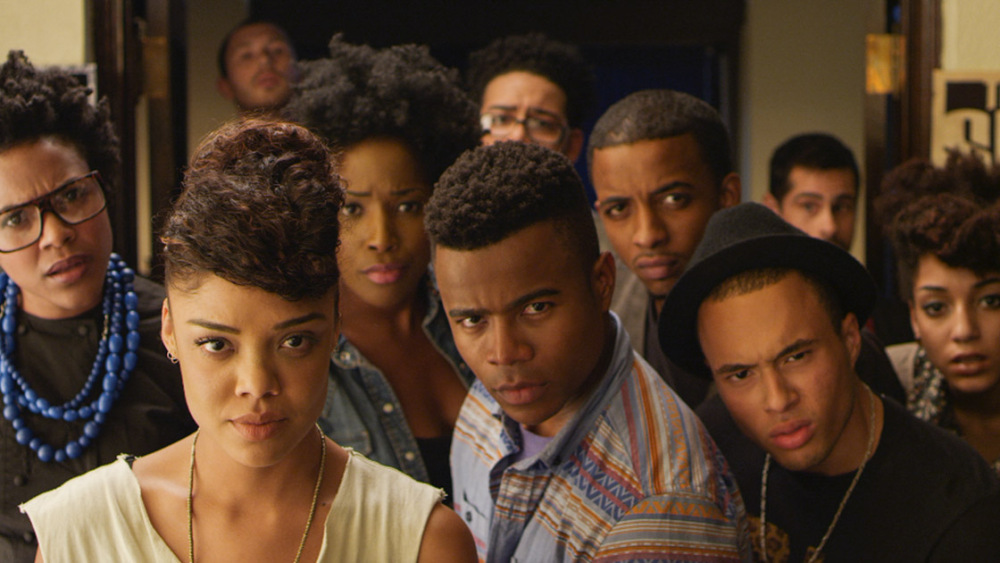
Just recently, I read an interview with Ava DuVernay (one of many I’ve looked up over the last month) in which she says the following: “So often when I see African-American performances on screen, it is in the voice of spectacle. I don’t feel like race is spectacle. Race is me. I’m a black woman. We are black people. And as we move around our daily lives, it is not a spectacle; it is the norm.”
I say this in context of this review because in Justin Simien’s Dear White People, there is no spectacle, but rather the overwhelming feeling that race, and all the messed up politics that come with it, affect the lives of people on a daily basis. By depicting four black students at an Ivy League university – each of which holds an entirely different view on the way their race, gender, or sexuality, impacts them – Simien is establishing exactly that: black is the norm.
Dear White People markets itself as a satire, and it is one, treating its serious issue with the wit and tact of filmmakers from eras past. But Simien is never bashful of drilling in the fact that, as humorous as this all is, this is practically what reality looks like. The film splits itself into the perspectives of four characters, and though the poster labels them rebel, token, poster child, and diva, there’s so much more to who they are.
There’s Lionel (Tyler James Williams), the queer black boy who’s seemingly gotten by just fine by staying quiet and doing his own thing. He wants to be a journalist and he serves as a perfect representation of people who aren’t sure if they’re black enough. There’s Coco (Teyonah Parris), the young woman who longs to be a reality TV star but is confronted with the reality that audiences don’t want a black woman who pretends to be white. They simply want the sassy, trash-talking, shit-starting, black stereotype they’ve come to know. There’s Troy (Brandon P Bell), the proper young gent who believes he runs the school and follows practically every rule his father, the school’s Dean, gives him. Until he’s dethroned as house president, that is.
And then there’s the one that could arguably be considered the true lead. There are the radicals, and there are the folks teetering the line between radical and not, much like Sam White (Tessa Thompson). She’s the kind of woman who makes silent films for class featuring actors in exaggerated whiteface make-up panicking because Obama was elected president. Needless to say, her Rebirth of a Nation draws criticism from classmates. “Thematically dubious,” they call it, but hilarious is what it is. Hell, if they ever decide to bring back another wonderful college-based network sitcom set in a predominantly black university (think a modern version of A Different World, a show I loved watching when I was younger and wish was around nowadays), a character like her would be ideal to watch week after week.
But her scathing attitude isn’t limited to the white individuals that surround her; she’s just as critical of her fellow black students. She explains that there are three types of black individuals in the university: OOFTA, NOSE JOBS, and 100. The OOFTA modulates his blackness up and down depending on the situation. NOSE JOBS smooth their black edges and try to fit in. 100 is keeping it 100% real. It’s the kind of statement that critiques some in her social circle and praises others, but needless to say, it’s one that doesn’t make her popular with most of either group. To phrase it just like one of the characters in the film does, “It’s like Spike Lee and Oprah had a pissed off baby.”
Sam, however, is not the character you’re supposed to agree with most the time. In fact, none of them really are (with the exception of potentially Lionel). What’s so interesting about Simien’s script, and what makes it so different to what any racist worried about the film might think, is that no one is exempt from criticism. While white people who assume they can appropriate black culture for one night as a party joke are clearly being shot down in the film, as they rightfully should be, Dear White People critiques the differing perspectives of its black leads as well. Sam, as previously mentioned, could arguably be seen as the film’s true lead, but her “controversial” radio show and opinions are not necessarily the ones that Simien wants the audience to agree with.
For all the claims of her peers being OOFTAs, Sam is just as culpable in perpetuating a certain image of a black person that shouldn’t account for her entire community. Even the script’s weakest point, the relationship between her and Gabe, has some stand-out moments that reinforce that idea. She’s pretending to be this revolutionary when she’s really just a filmmaker who loves Ingmar Bergman and Taylor Swift. But that’s part of the point; no one should be forced to present a certain image in order to represent an entire community, and changing oneself to fit a mold is inherently wrong.
One of the film’s most powerful scenes features the four leads (whom I must say deserve all the ensemble praise in the world), presumably staring into their mirrors, prepping for the blackface party and reflecting on the way they all change their blackness for the sake of convenience. The scene is accompanied by some off-beat jazz (have I mentioned how stellar the film’s use of classical music and jazz?) and a reading of the blackface party’s invitation letter. It’s devastating, especially with the knowledge that there are people out there who really do believe trying to be white is the only way to be beautiful; Teyonah Parris’ donning of the blonde wig and light make-up in particular makes for a harrowing image.
Not everything in Simien’s Dear White People is as in-your-face as it seems at first glance, and there’s a lot that his presentation of the film says in a much subtler way than his witticisms and dialogue. It’s a gorgeous production, one that never looks like it came into existence through crowd-funding. The cutting between characters often comes off as a little off-beat, and yet other times the editing is used to beautiful effect by helping to reinforce the dichotomy between each black lead and their respective social status. The sets, the costumes, the cinematography, all of them come together to present the vision he’s got, and while it’s clear that he’s drawing from multiple visionary directors he’s fond of, it’s all for the sake of making the writing come across as crisply as possible.
What’s most interesting is that a number of reviews have already cited names like Wes Anderson, Whit Stillman, and Woody Allen, among others, as what the film comes closest to. Notice anything? They’re all white filmmakers who typically depict the lifestyles of rather upscale (bourgeois even) characters. If anything, the only black filmmaker to constantly show-up is Spike Lee. In a way, this goes to show that, with black characters, Simien has smartly inhabited a world that is typically only reserved for white filmmakers and characters. And, as such, he’s able to give a critique of being a black student in a predominantly white, and ultimately rather racist, university system. As much as its president likes to say, “We don’t have an intolerance problem at this school,” it’s still the kind of place that allows bullshit – like blackface parties for instance – to go on without punishment.
He understands we live in an era where white people are so blind to the power of their race (something that The Whiteness Project has so smartly exposed) that they’ll take offense to the concept of a film titled Dear White People, but because of that, he doesn’t isolate any of his white audience either. It’s not a film that puts down all white people. Its jabs at white people actually come across as genuine and amusing, only targeting those who actually offend, unlike with other projects by white filmmakers on black subjects that make white people jokes feel forced (see: any Tate Taylor movie). Instead, it’s a film that’s trying to nudge its privileged white viewers into understanding what that privilege allows them to do, and why they shouldn’t abuse it. It never preaches this fact outright, but smartly presents itself as a comedy for everyone. To quote its tagline, “A satire about being a black face in a white place.”
I’ll admit, without hesitation, that it’s been a strange experience writing my review of Dear White People as a white-passing Latino film critic. To a certain extent, I feel as though it’s not my place to be discussing this in so much depth. But to not talk about its importance at this moment in time, regardless of the level of discomfort it instills in audiences and critics alike, would be a crime. It may not be a perfect film, but at least Simien’s a filmmaker willing to confront people with questioning their racial identity and making them face the reality that post-racial America is bullshit.
—
Directed by Justin Simien; written by Justin Simien; starring Tyler James Williams, Tessa Thompson, Teyonah Parris, Brandon P Bell, Justin Dobies, Kyle Gallner, Marque Richardson, Dennis Haysbert, Peter Syvertsen, Brandon Alter, and Brittany Curran; 100 minutes.
Dear White People is currently going through a limited release and opens nationwide on October 24th. Currently playing in Miami at O Cinema Wynwood.



 Derek
Derek
 Isabelle
Isabelle